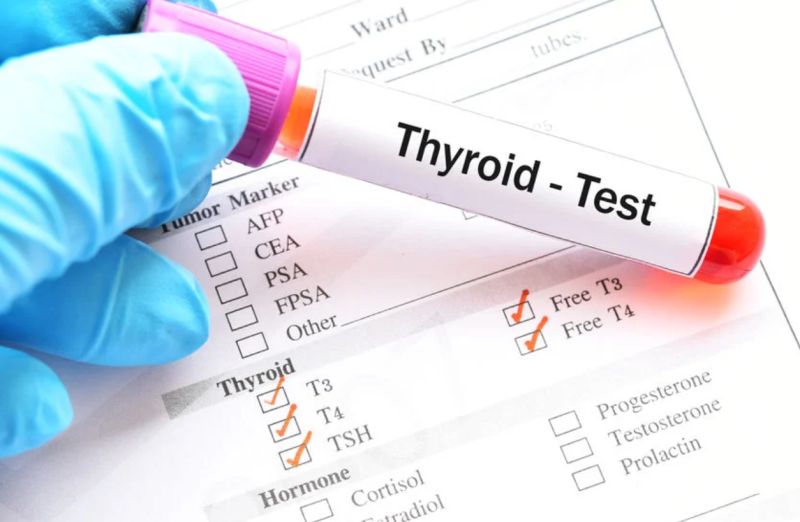
TSH, or thyroid-stimulating hormone, is a molecule implicated in possible dysfunctions of the gland. That is why, when we have specific symptoms related to this organ, the doctor asks us for a test that measures the levels of TSH in the blood.
A low TSH indicates a disorder that needs to be studied further. Many times, this test is the first of several that will follow.
Contents
What is TSH?
TSH is also called thyroid-stimulating hormone, or technically thyrotropin. The pituitary releases it after the stimulus it receives from the hypothalamus through another hormone known as thyrotropin-releasing hormone or TRH.
Once TSH is in the blood, it contacts the cells of the thyroid gland to produce two more hormones:
- T3 or triiodothyronine: it is much more active than T4 and is the one that exerts its effects on the tissues; that is, it regulates their metabolism.
- T4 or thyroxine: has minimal activity on tissues. It is more of a T3 reservoir since when T4 reaches the tissues, it can be converted into T3, which exerts the final action.
The T3 and T4 will go to the tissues to control the metabolism of proteins, carbohydrates, and fats. In addition, in babies, these hormones are essential because they help the normal development of the brain tissue of the newborn.
Why can TSH drop in the blood?
Low blood TSH may be due to a dysfunction in the hypothalamus, pituitary gland, or thyroid. Conditions associated with this gland are usually the most common cause.
According to a study published in 2017, which included around 4,554 people between 18 and 93, the prevalence of hypothyroidism in the Spanish population was 9.1%. On the other hand, the majority of hyperthyroidism was 0.8%.
Both disorders together would affect almost 10% of the population, and it would be possible to find an abnormal TSH result in all these patients. Three pathways regulate the hormone in question:
- Amount of TRH released by the hypothalamus.
- The same pituitary gland is in charge of storing and releasing TSH when appropriate.
- Negative feedback from thyroid hormones.
What is negative feedback?
When too many thyroid hormones are produced, they increase in amount in the blood. The hypothalamus and pituitary gland sense this rise and reduce their production of TRH and TSH. This is what we call negative feedback.
The hormones themselves regulate themselves to have stable levels in the blood and not be so high. If this mechanism did not happen, we would constantly enter hyperthyroidism or hypothyroidism.
TSH blood levels
Normal blood TSH levels are between 0.4 and 4 mIU/L. If they exceed or have less than these values, it means there is a thyroid dysfunction. In general, in the first half of pregnancy, TSH decreases in the blood, while this hormone is usually elevated in newborn babies.
Common causes of low TSH
In particular, a low TSH means that there is so much T3 and T4 in the blood that they give negative feedback to the pituitary gland, preventing production. In general, in this scenario, we have hyperthyroidism.
There is also low TSH as a result of secondary hypothyroidism. This happens when there is a pituitary dysfunction, either because a part of it has been destroyed or something prevents it from working correctly, such as a brain tumor.
Finally, tertiary hypothyroidism may be the culprit. That is, the hypothalamus does not work and stops producing TRH. Therefore, it does not send signals to the pituitary gland to produce TSH.
In the first case, when peripheral thyroid hormone overproduction occurs, we will find very high T3 and T4 in the blood, indicating an over metabolism. The body will begin to burn all the fats and sugars for energy.
For its part, in the face of hypothalamic and pituitary dysfunction, thyroid hormones will also be decreased. In this sense, the body’s metabolism will be slower, so it will accumulate fat and gradually gain weight.
On the other hand, several drugs can alter thyroid function tests, regardless of the underlying disease. According to studies, some of the medicines that can cause low TSH levels are the following:
- Dopamine.
- Dobutamine.
- Amiodarone.
- Corticosteroids.
- Somatostatin analogs, such as octreotide.
Treatment of TSH disorders
Hyperthyroidism
Symptoms of hyperthyroidism are nervousness, rapid heartbeat, hyperactivity, and increased sweating. There is also hypersensitivity to heat, increased appetite, and weight loss.
If you think you may have hyperthyroidism, see your doctor. The professional will perform blood determinations of TSH, T3, and T4. According to studies, a hyperthyroidism diagnosis will be confirmed if the TSH is low and the thyroid hormones are high.
The causes can range from a thyroid tumor to an autoimmune disease, in which the antibodies overexcite the thyroid cells. Some medications reduce and control the symptoms.

Hypothyroidism
The opposite symptoms, such as tiredness, weight gain, cold intolerance, and hypothermia, indicate hypothyroidism. We may have brain tumors that destroy the pituitary gland or compress it, preventing it from releasing TSH. It can also be a low production of T3 and T4 in the gland.
According to research, low free T4 and low TSH levels reveal a more serious problem linked to the destruction of the pituitary gland, called central hypothyroidism. On the other hand, if the TSH is normal or high, the suspicion is oriented to the thyroid gland.
Low TSH suggests a hormonal disturbance.
As you can see, low TSH can be associated with the improper functioning of different organs. In this sense, it is vital to carry out the pertinent examinations to identify the affected structure and start treatment. Therefore, if you suffer from any of the symptoms above, do not hesitate to seek medical assistance as soon as possible.